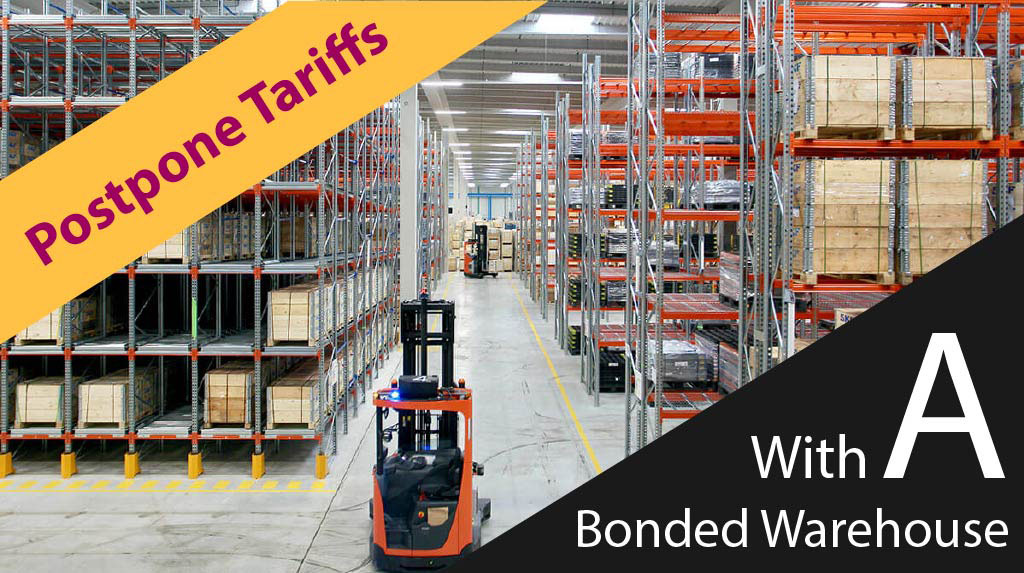Deferring Import Duties and Tariff Costs

Let's outline the benefits of using a bonded warehouse for deferring tariff payments, specifically in the context of those imposed during trade wars and which may be eventually reduced or removed.
Using a Customs Bonded warehouse can help defer the timing of paying tariffs and other import duties. This strategy allows the importer to pay only on the quantity taken out of the warehouse at that time or move it along to a new market without importing. These warehouses can be located anywhere and can be public or private. They typically handle pallet level quantities and move products to another warehouse after clearing but will not accommodate direct to consumer shipping like a 3PL.
Of course, cash flow is a top consideration when deciding whether this strategy is feasible. The cost of borrowing and storage fees may be less than paying hefty tariffs which may be reversed.
Here are a few detailed points to consider:
- Tariff Deferral:
- The most significant advantage is the ability to delay paying duties until the goods are withdrawn from the warehouse for consumption. This provides a crucial buffer against immediate high tariff costs.
- If tariffs are reduced or eliminated due to future negotiations, the importer only pays the lower (or no) duty applicable at the time of withdrawal.
- Financial Flexibility and Cash Flow Management:
- Deferring duties frees up working capital that would otherwise be tied up in immediate tariff payments.
- This improved cash flow can be used for other business operations, investments, or to mitigate the impact of potential revenue delays.
- The costs of warehousing and potential interest on borrowed money to cover those costs, could be less than the large upfront tariff payment.
- Inventory Management and Gradual Release:
- Bonded warehouses allow for the storage of bulk shipments, enabling importers to release goods in smaller, more manageable quantities as needed.
- This "just-in-time" approach reduces the risk of overstocking and minimizes storage costs.
- Pulling product by the pallet versus the entire container allows for a more controlled release of product.
- Avoiding Immediate Tariff Impact on Existing Stock:
- For goods already in transit when tariffs are imposed, a bonded warehouse provides a means to store them without immediately incurring the new, higher duties.
- This protects the importer from unexpected and potentially substantial financial burdens.
- Potential for Duty Reduction or Elimination:
- As you mentioned, if tariffs are subject to political negotiations, there's a chance they could be reduced or eliminated.
- By storing goods in a bonded warehouse, importers can capitalize on any favorable changes that may occur, paying only the duties applicable at the time of withdrawal.
- Improved Logistics and Distribution:
- Bonded warehouses can serve as strategic distribution points, allowing for faster and more efficient delivery to customers.
- This can enhance customer satisfaction and improve overall supply chain management.
- Flexibility in Handling Damaged or Non-Conforming Goods:
- If goods are damaged or do not meet specifications, they can be re-exported from a bonded warehouse without incurring duties.
- This provides flexibility in managing returns and minimizing financial losses.
- Security and Control:
- Bonded warehouses are subject to customs supervision, ensuring the security and integrity of stored goods.
- This provides a level of protection against theft or damage.
Considerations:
- Warehousing Costs: Storage fees, handling charges, and insurance costs must be factored into the overall cost-benefit analysis.
- Time Limits: There are typically time limits for how long goods can be stored in a bonded warehouse.
- Bonding Requirements: Importers must post a bond to ensure compliance with customs regulations.
- Interest on Borrowed Capital: if capital is borrowed to pay warehousing costs, then that interest must be factored into the total cost.
- Revenue Delay: If the business needs to sell the product quickly, then the delay caused by warehousing the goods may be too costly.
In summary, utilizing a bonded warehouse can be a strategic move for importers facing fluctuating tariffs, offering financial flexibility, inventory control, and the potential to capitalize on future tariff reductions.








